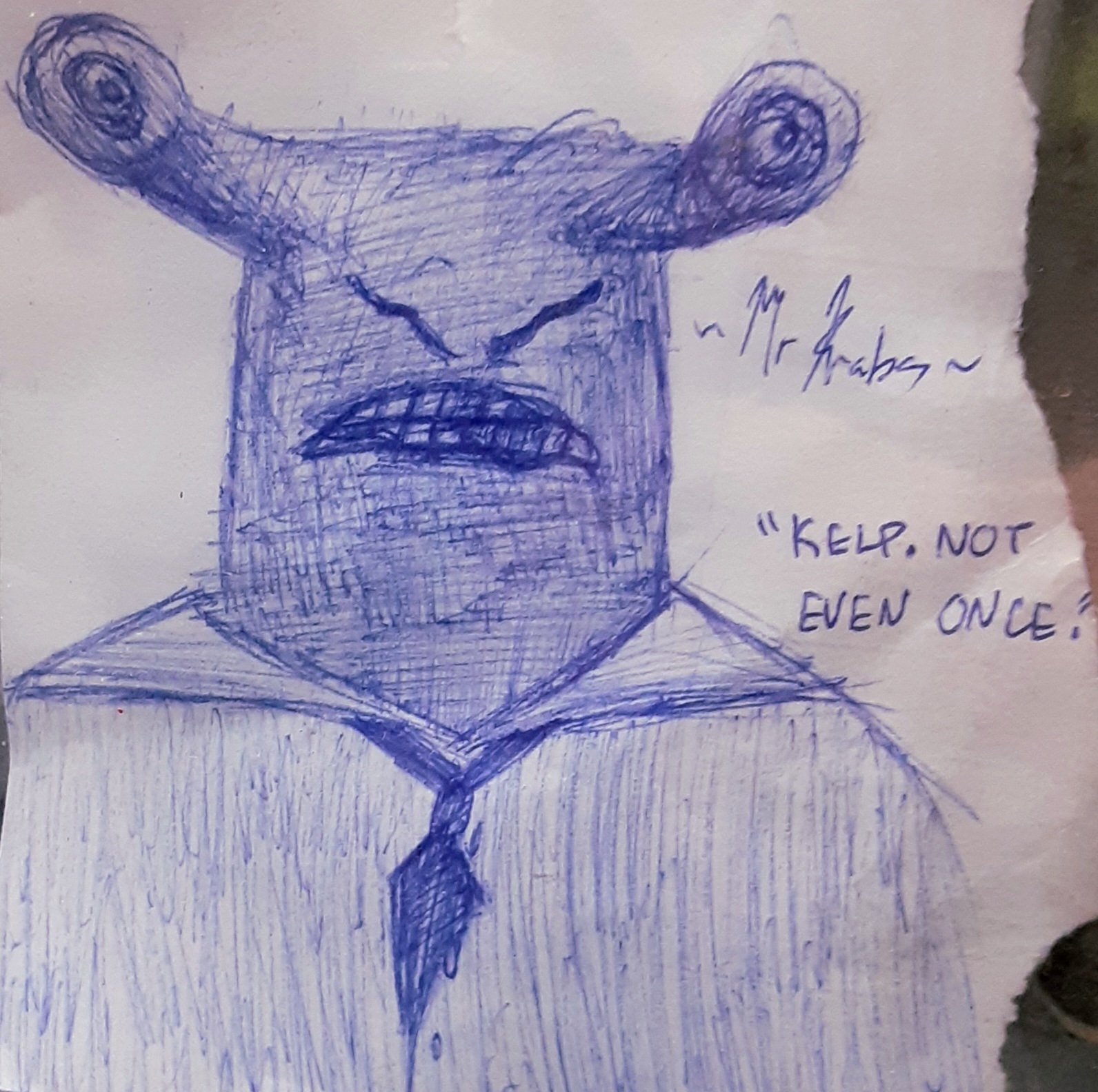In some of the music communities I’m in the content creators are already telling their userbase to go follow them on threads. They’re all talking about some kind of beef between Elon and Mark and the possibility of a boxing match… Mark was right to call the people he’s leaching off of fucking idiots.
These products - Googles convenience products as well as the Social Media shite - were introduced gradually at the time. The single steps people took towards using these products seemed innocuous. Before you know it, your whole life is enmeshed in a privacy nightmare and the convenience and quality you were used to is gone. It’s like buying an apartment in a nice place of town and then within the next two decades the area turns into a shady ghetto slum.
My brother in law is like this. He keeps a yearly journal on google drive and his logic is that since he keeps it on google drive he doesn’t care if google know everything about him or not. The convenience of having it heavily outweighs any privacy that he might have. Though I wonder if him growing up in an authoritarian country has something to do with it.
Sigh, just tell me which team to join, so I don’t have to make anxiety producing decisions and alienate anyone. Don’t wanna rock the boat!
Bigger is better, right?
/S in case it isn’t obvious.
So there’s a lot of doom and gloom here, but what do we actually do about it? How do we do it? ~Strawberry
I am not an average person having worked in IT for a couple of decades now and I can tell you no, the average person is either not aware or doesn’t care.
Even I, and my peers who are very aware, don’t care
I think where privacy minded people fail to understand is that for most people we are not committing crimes or shady shit online therefore why care? A lot of us understand that if you type anything in a computer it is assumed to be on the public record either easily found or through a few hoops to get it.
If you want privacy write it down on paper or talk about it in person with your peers. Those are the most secure things.
Online and privacy are oxymorons. People need to understand this.
A lot of us understand that if you type anything in a computer it is assumed to be on the public record either easily found or through a few hoops to get it.
The problem is that nowadays your medical documentation, banking and other sensitive data is all transferred through a computer. And it should be protected and private.
For all intents and purposes it is “private” though. In your examples specifically banking and government, that data is not used for anything nefarious. People are screaming into the wind on Facebook, twitter, google, et al. In all of these there is an unspoken agreement that “we get it for free and you get our data to use as you will”. The vast majority of the public is oblivious to this or gets it and doesn’t give a shit because you are literally screaming into the wind.
Is it right? I’d argue no. But it is what it is. Control what you can.
I think where privacy minded people fail to understand is that for most people we are not committing crimes or shady shit online therefore why care?
Yeah, I hate that argument (the typical “If you don’t have anything to hide, why should I worry”). Because you might not have anything to hide (debatable), but you know who does? Journalists, political activists, people in witness protection, people who suffered from domestic violence or human trafficking and need to hide, etc…
Don’t collectively erode people’s right to privacy, because there are people whose lives depend on it; and who knows, you might need it some day.
I agree with you 100% but it’s a very black and white way to look at things and the world is grey. Furthermore, the world feels drastically different than we do.
This position is full of generalisations and false dichotomies. Care / don’t care, private / not private.
A lot of us understand that if you type anything in a computer it is assumed to be on the public record either easily found or through a few hoops to get it.
This is pure hyperbole. Sure a lot of idiots don’t realise that the platforms they’re using are not private, but it’s usually only admins that can access their stuff - it’s not “on the public record”.
The honest question then is why are you or anyone else online period? Who do you vote for? Where do you have accounts? The list goes on and on. The world has spoken. We are the vast minority regardless of if we are “right” or not. I agree with those privacy minded individuals but at the same time I have a life and in the grand scheme of things there are far larger problems out there.
Sorry I don’t understand what you’re getting at.
One can participate online and make choices about what risks to privacy we are willing to tolerate.
It’s not a binary “everything online is not private” because privacy is subjective - it depends on the context.
You’re proving my point. Everyone here is screaming into the wind when the vast majority have spoken. They’re willing to tolerate the risks. Those risks may be with google, or Facebook, or Lemmy but it’s always risk.
What I see here is a lot of complaints about everyone not being privacy minded from people on soapboxes. We do not represent an “average technical person”. You would be surprised what seasoned InfoSec people do and the tools they use. The path to full privacy is one of isolation and insanity.
Control what you can. It would make a lot of you much happier people.
the path to full privacy
Someone already explained to you the difference between privacy and secrecy, which is quite simple.
Privacy: you don’t want your mother to see a lewd picture from you, but you would want your partner to Secrecy: you don’t want anybody to know you eat poop
I don’t think I am proving your point, you’re just not actually reading what I’m saying, or maybe we’re talking about two different things.
You’re talking about “everyone”, while I’m talking about me.
The path to full privacy is one of isolation and insanity.
What even is full privacy. My point is that the risks to privacy are many and varied. As I said it’s possible to participate online while making intelligent choices about what privacy we’re willing to give up.
“Arguing that you don’t care about the right to privacy because you have nothing to hide is no different than saying you don’t care about free speech because you have nothing to say.” ― Edward Snowden
Hard disagree. I just am pragmatic. I only have so much energy and unless you noticed the world is literally burning.
It is burning in part because any organized movement against social or economy change that is big enough is stop by interference by the government. You can’t organize a blockade of streets or a riot it the FBI is in every chat that you use to organize a group of activists.
I think where privacy minded people fail to understand is that for most people we are not committing crimes or shady shit online therefore why care? A lot of us understand that if you type anything in a computer it is assumed to be on the public record either easily found or through a few hoops to get it.
The issue isn’t that people are trying to hide their crimes or their shady shit, it’s that the information about ourselves that we did not post online/are only letting a select few know are being revealed to strangers without our consent. It’s about the choice of who we are willing to reveal what to. Are you willing to let strangers know every aspect of your daily life? What you eat, when you sleep, when you poop, where you go, what you like to do etc. Because that’s what companies want with data collection, to know every aspect of you, the good the bad the ugly, so that they can market your data to advertisers and constantly push their products to you. Taken to the futuristic extreme, they can and will push toilet paper products to you while you are on the toilet, or advertise gym services while you are eating dessert, or maybe even push sex products while you are in bed with your partner. It’s this sort of future that many people are worried about and want to prevent from happening. (And this isn’t even talking about what governments can do with this sort of data collection.)
People want the choice of being able to reveal select information to select people. That’s what privacy is.
I’ve given up on privacy. Like I knew in my heart of hearts they were recording everything long before Snowden confirmed it.
It honestly feels kinda like being on Twitch, knowing I’ve got watchers.
I don’t think there’s a good reason to be worried about this aspect of my “privacy,” and I think the people who care are borderline chemtrail-level mistaken about how this data is used.
I am pro data collection, as a whole.
I guess the bot accounts are already starting. Sigh.
Yeah that must be it.
Even if you get them to care once you show them all they need to do to have a shred of privacy they shrug say something along the lines of “well I don’t have anything to hide anyways” and go back to their merry way. The path of least resistance will always win sadly
Literally saw a comment like that yesterday. Drives me up the wall. I’m in the process of accepting that the average Joe/Jane just doesn’t care about anything but their little bubble. I used to spend so much emotional energy on trying to convince people to stand up for something greater or to at least think more than 2 meters ahead, but now I’m just done. I’ll watch out for myself and the people close to me, everyone else can just evaporate for all I care.
Congratulations, you now have your own little bubble.
Lol true but teaching people better ways is like swimming against the tie. Heck is even hard with people close to me !
I literally just had a friend tell me he joined Threads and how neat it was, etc etc and when I explained why I wouldn’t be joining him, he basically just gave me the old “Well I already know they have all my information so it doesn’t matter”
…like wtf? So you just…give up having any privacy whatsoever? I just couldn’t respond to him after that, I don’t really know how to respond to that. There’s a disease spreading in the world unfortunately and it isn’t just COVID. It’s one called Apathy and too many people are coming down with it.
Honestly he has a point. I was born right before Y2K. My entire life has been online. I’m sure with enough digging this account can be linked back to my IRL identity. They already have any and every bit of information about me, what’s a little more?
People don’t care and are never going to care. They can track us by anything already and don’t need you to give them any info. The algorithms that they use can identify you if you sign up or not.
It’s not apathy per se, it’s more resigned acceptance. There is no privacy anymore, even if you do everything in your power not to be tracked. Unless you live completely off the grid, cash transactions in places without security cameras only and no bank account/online accounts you’re going to be tracked by big tech.
Ultimately, it’s because the concerns of privacy are simply too far removed from people, or they trust certain entities more than others.
For example, if your next door neighbour knows all your browsing history, people would be bothered, but people are not bothered if Google knows as it feels they would have no direct effect on their life, whereas your next door neighbour might.
This can be easily seen in the whole discussion regarding privacy on Mastodon.
A lot of people refuse to use Mastodon over Twitter, because “Mastodon admins can see my DMs”, even though Twitter absolutely could as well (Twitter apparently has encrypted DMs since May 2023 though). The reason for this is they see a Mastodon admin as someone who could potentially have an effect on their digital life, whereas they trust Twitter not to do anything with the data since they’re a big corporation who has nothing to do with their personal life.
Unless it is an effect they can directly observe (or imagine to occur), people simply don’t care. This applies to almost all discussions around the big picture, such as things like climate change or unions, or whatever.
Whether we like it or not, people absolutely trust corporations.
I would not say, people absolutely trust corporations.
You can probably ask any stranger o the street if Facebook is trustworthy and they all would say something about FB doing weird stuff with their data.They all know!
But people have a limit on how many issues they can care about.
We decided that privacy is an issue, others might decide that the issues their sister is facing in life are an issue, or just how to pay the next month’s rent.So, they just use Facebook, google and co. because that is what works, what is there and done. No time to think any further about it!
So, if you wanna get wide adoption for privacy-friendly alternatives, stop solely selling the privacy aspect. The fediverse is great, but all the people who care about the benefits of it are already here. Now try to reach those who don’t care that Twitter is a mess, they are just there because all the others are too.
They use it to communicate and not because it is great. The same applies to most other platforms too.
I liked Reddit because it’s one platform where you find literally anything! You wanna talk about energy drinks? There is a subreddit.
You wanna know what this thing is you just found on the street? Just post a picture someone definitely knows!True, the claim that people “absolutely trust corporations” is definitely hyperbole, but I would say they most certainly have some implicit trust for them in a way that people might not trust a volunteer.
The problem isn’t privacy. It’s how they use the data they get from you to lie to you.
Most people do not have to a reason to care about privacy, until the day their private comms/data gets leaked and abused is when they will give a damn.
But that’s not the kind of privacy we’re talking about. Privacy discussions are largely about ad tech and tracking. The post here isn’t calling people idiots because he thinks Threads is more likely to leak your credit card numbers and nudes. He’s calling people idiots for not caring about tracking the way he does. And the reality is that there’s no real reason why they should care. The argument boils down to just, “c’mon, don’t you think it’s creepy?”. And if I say, “not really”, we’re kind of at an impasse. There’s just no obvious pragmatic harm you can point to to reason them over to your side. You may as well being trying to convince them to enjoy pineapple on pizza. If they don’t already, the game’s pretty much over.
I really think this thread is a great example of why the average person doesn’t care that much.
The whole thread is full of comments like “the issues caused by giving away all your data are too abstract, too far away, or too difficult to understand”. This is true by the way, I completely agree.
But I haven’t seen a single comment trying to explain those possible issues in an easily understandable way. The average person (or, at least me) reading threads like this won’t learn anything new. Give me a practical issue that I might face, and if I agree that it’s an issue, I’ll focus more on avoiding that issue.
In other words, an example:
- Let’s say I’m a person using lemmy/mastodon, only using privacy-focused search engines etc.
- If I would now change to using facebook/threads, started using Chrome as my browser, etc the usual mainstream tracking stuff - what problems can this cause for me in the future?
PS. I do agree with the notion of “minimize the data you give away”, which is one reason I’m here, but I really don’t have an answer for these questions. I’m like “I understand the point of privacy, but can’t explain the reasons”.
If an algorithm knows exactly who you are, then it knows how you think, and it knows what sort of content will manipulate you politically. And right wing political content is profitable. It’s called the alt right pipeline. Most people have some kind of argument that will manage to radicalise them to any position you can name. Through correlative learning, an algorithm will look at how people like you changed their views, and it’ll send you down the same path. It’s easy.
Cambridge Analytica. Not only did they influence the elections and general political attitude of the Philippines, it also affected US elections as well. I think there was a genocide that was caused by targeted campaigns too, not sure where it happened, though.
don’t forget Facebook knowing that their programs increased teen suicide rated but still stayed course because changing that negative content would lower revenue
Don’t you feel like awareness of it can be the number one thing to protect you from the manipulation that is rampant? I look at everything and say that is trying to change my mind. Unfortunately, with that comes this cynicism that I’m being sold to all the time and whatnot. But if I happen to hop on a browser that doesn’t have AdBlock, I don’t walk away having spent money on snake oil, or I don’t go sign up for my local right wing political action committee, because I’ve been made aware consistently that everything is aimed at getting me to give something.
And let’s be real, we all remember the constant reference to the Reddit hivemind. If we’re saying they’re wasn’t some sort of external influence that landed everyone on the same wavelength, that feels naive. Or I’m a cynic and can’t enjoy anything anymore.
No, awareness isn’t the number 1 protection, it’s the number 3 protection. The number 1 protection is actually having a nuanced understanding of the issues so that when propaganda tries to prey on your misconceptions, it can’t find any. And the number 2 protection is avoiding propaganda, because anything starts to sound persuasive if it’s repeated enough. Awareness is important, but it’s just not as effective as those two other protections. It has too many weaknesses.
I think that’s pretty well put and I’ll agree with it.
In spite of everything telling me not to I still pop over to Reddit because I think there is still value there, even if I have to wade through the bullshit and the bots and whatever. A couple subs weren’t infested with shit yet. But for sure it’s a risk assessment, and I think I got it, but probably I’m not as smart as I think.
Bad actors may use it to manipulate you or cause problems in other aspects of your life (HELLO data breaches!).
This is a hypothetical. Think about all of the normal stuff people could see about you on Facebook. Would you also want those strangers to have your other personal information and possibly passwords? How about your boss? School? Insurance agency? Bank? Someone who works at one of those places, and still remembers that information after they clock out?
Let’s say there isn’t a data breach. They also use that information to try to get you to click ads, even if those ads might be unsafe to click.
Please answer something for me. What is it that makes you think that Zuckerberg would act in your best interests? What would stop him from turning around, selling data again? How can you know that he will keep that data in trustworthy spaces, and away from bad actors?
I wouldn’t even give my own parents access to that level of information unless I absolutely had to. I’m certainly not happier about a stranger having access to it.
deleted by creator
I’ve always felt like data gathering is kind of like lobbying. It is not directed toward you in person. It is used to shift the way people think and their opinions on topics.
A company / non-profit / movement / whatever lobbying towards a goal might be buying lunches or making seminars and talking about their point with selected group of people who have a say in a topic. Or they might not but they are in the vicinity of the topic or perhaps they are a group that a the company feels like they do not know what the fuck they are talking about and that needs to change.
These are not directed toward you but to a group of people whom you most likely have nothing to do with. This group has power to change something. Whether for good or for bad, that depends who doing the lobbying and for what purpose and how you think about the topic.
Data gathering is similar. This data that is being gathered is not identifiable to you (or it can be but this is not what I am talking about) but it gets clumped together with a buuuuunch of people. This bunch might be people from country x or Christians or people who like Mc Donald’s or who are against gun-rights or pro abortion or people whom think that companies should not be pushing climate change responsibility to the consumer. This clump of people are the same bunch that the lobbyists are targeting. But they do not have direct power over a subject, in general. Point being that even if most of the people have no power over a topic, some of them might (they might hold power oma person company deciding whether to do more against climate change). And even if they do not, they will converse about the topic and this will shift the general consensus around a topic.
And this bunch of people can be very accurately targeted. People in their 20-30s, who graduated (or will soon) from a university that are most likely to go work in high-tech companies in or in the government who have people around them (family, friends) that are against gun-rights but still own guns and do hunting? Ezpz. Or perhaps own a car and drive a lot and have relatives far enough that car is a necessity but have shifted their thinking being more against cars? Np.
The problem is that this does not easily be used against you in particular. But it can be used against a group of people that you are a part of. It is used to shift the way we think as a community. It is used to push ads and news articles (or just the topics of articles because glancing it also works) to you, comments in twitter, posts in Facebook, and change the search results that you might see. Kind of like ads as well; ads work really well even though lots (most?) people would say that ads don’t make them buy a product and only annoy them. Advertisers aren’t dumb, they know exactly what people think and how they function, and ads work.
And again to reiterate, it has nothing to do with you. You are a blip. But you are a part of a larger community and in order to shift that community toward something all of its little bits and pieces need to be moved toward that target. Not all of them need to move toward that target. Just enough.
This got a bit rambly I think but anyhooo it’s kinda how I see it.
So, if I understand correctly, and please correct me if I’m wrong, but the simplified version of this is: data collection allows massive cooperations to target Communities of Interest (CoI) and manipulate them by collectively altering their digital perception via a barrage of targeted advertisements, promoted articles and suggested social media posts?
And all of this leads to an eventual shift in the opinions and desires of said CoIs, leading to what the company would deem desirable behavior, be it growing apathetic to digital privacy, buying their product or growing more engaged with their platform?
This isn’t a plug, but it is a link to an article I wrote for exactly this reason. I tried to succinctly explain why privacy matters with real work examples and precedent.
Great content here, thanks
I remember back when Snowgen first leaked all of that imfo about government tracking. One show, either the daily show or colbert report, did an episode about it. Almost no one they talked to cared until they mentioned the government can also track your dick pics.
Americans don’t care about privacy unless it’s China collecting data.
And even then, it’s lukewarm at best. I mean, Tiktok is still stupidly popular.
If China wants to see how much of my TikTok is split between chubby goth girls and Taylor swift, they are more than welcome to that. If they want to know I mostly browse TikTok on my toilet, in the evening, they are more than welcome to that too.
Not exactly a national security issue.
Everyone has to chose what’s right for them. The reality is Facebook having and selling that data will never impact the average person. But not be part of the family because you are not on Facebook is a real thing that will affect people.
To be fair, you basically have to give up on your privacy if you want to be a public figure these days. To make it most musicians have to constantly evangelize themselves, which means being omnipresent on social media platforms.
Posting your band’s tour dates on Facebook doesn’t really even change your privacy status that much.
Whether you have a Facebook account or not, Facebook tracks you around the web. Data brokers sell your data. Your cell phone company sells your location and browsing history, etc.
People over-estimate how much not using any given social media app really matters.
Now granted, installing it on your phone gives them a level of data they wouldn’t have from a web browser. That’s probably why Threads is phone-only.
Fair enough. I took efforts a few years back to eliminate all my social media, and started a new reddit (now lemmy) account and made efforts to be more anonymous
I’m sure they collect some info on me, but for me its about not just handing it over.
















